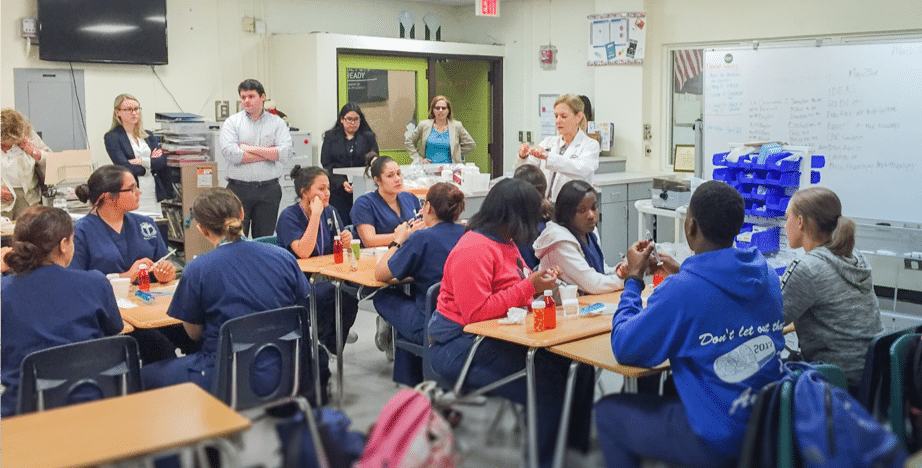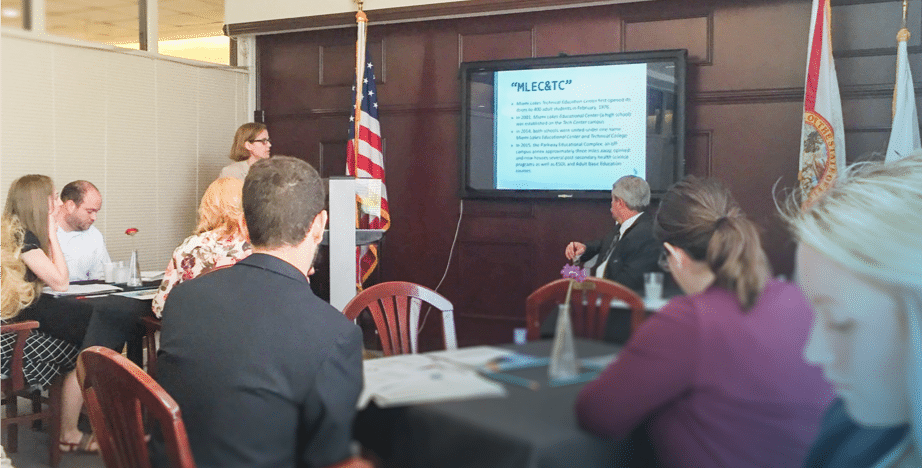Overview
The American Youth Policy Forum (AYPF) is a nonprofit professional development organization that provides learning opportunities for policymakers, practitioners and researchers working on youth and education issues at the national, state and local levels.
On February 23-25, 2011 AYPF hosted an invitation-only study tour for Congressional and senior Administration staff to the San Francisco Bay Area, California to examine innovative and promising approaches to developing college and career readiness for all students, as well as implications of the innovations for federal education policy.
Participants learned about two innovative models that use project-based learning to prepare students for college and careers: the Napa New Tech High School model (Napa) and the Envision Schools model (Hayward). Visits provided an opportunity to witness first-hand how instruction and assessment differ from models used in traditional high schools by observing classes and talking to principals, teachers, and students. School leaders and state-level policymakers shared their lessons learned about capacity-building, professional development, teacher preparation, instructional design, standards, assessments, and accountability, as well as strategies for scaling up these innovations.
TRIP RESOURCES
Multiple Pathways
Envision Schools
Napa New Tech School
PRESENTER BIOGRAPHIES

Dr. David T. Conley is Professor of Educational Policy and Leadership in the College of Education, University of
Oregon. He is the founder and director of the Center for Educational Policy Research (CEPR) at the University of Oregon, and founder and chief executive officer of the Educational Policy Improvement Center, a 501(c)3 not‐for‐profit educational research organization. CEPR and EPIC conduct research on issues related to college readiness, college and high school course content analysis, high school‐college alignment and transition, and large‐scale diagnosis and assessment of college readiness. Dr. Conley serves on numerous technical and advisory panels, consults with educational agencies nationally and internationally, and is a frequent speaker at national and regional meetings of education professionals and policymakers.
In 2003, Dr. Conley completed Standards for Success, a groundbreaking three‐year research project to identify the knowledge and skills necessary for college readiness. This project, funded by the Washington, D.C.‐based Association of American Universities (AAU) and The Pew Charitable Trusts, analyzed course content at a range of American research universities to develop the Knowledge and Skills for University Success standards. In 2005, Dr. Conley published his research from this project in College Knowledge: What It Takes for Students to Succeed and What We Can Do to Get Them Ready.
Since 1996, Dr. Conley has received over $28 million in grants and contracts from federal and state governments, national education organizations, and foundations to conduct research on a range of educational policy issues. He has published the results of this research and other studies in numerous journal articles, technical reports, conference papers, book chapters, and books, including Who Governs Our Schools?, which analyzes changes in educational policy and governance structures at the federal, state, and local levels. Dr. Conley’s most recent book, College and Career Ready: Helping All Students Succeed Beyond High School, which features case profiles of America’s most college‐ready high schools, informs policy‐makers, administrators, teachers, parents, and students how they can develop a culture rooted in postsecondary success. Dr. Conley received a BA with honors in Social Sciences from the University of California, Berkeley. He earned his master’s degree in Social, Multicultural, and Bilingual Foundations of Education and his doctoral degree in Curriculum, Administration, and Supervision at the University of Colorado, Boulder.
Before joining the faculty of the University of Oregon in 1989, he spent a total of 20 years in Colorado and California as a school‐level and central office administrator in several districts, an executive in a state education department, and as a teacher in two public multicultural alternative schools.
 Linda Darling-Hammond is Charles E. Ducommun Professor of Education at Stanford University where she has launched the Stanford Center for Opportunity Policy in Education and the School Redesign Network and served as faculty sponsor for the Stanford Teacher Education Program. She is a former president of the American Educational Research Association and member of the National Academy of Education. Her research, teaching, and policy work focus on issues of school reform, teacher quality and educational equity. From 1994-2001, she served as executive director of the National Commission on Teaching and America’s Future, a blue-ribbon panel whose 1996 report, What Matters Most: Teaching for America’s Future, led to sweeping policy changes affecting teaching in the United States. In 2006, this report was named one of the most influential affecting U.S. education and Darling-Hammond was named one of the nation’s ten most influential people affecting educational policy over the last decade. In 2008-09, she headed President Barack Obama’s education policy transition team and continues to serve as a policy advisor to the president.
Linda Darling-Hammond is Charles E. Ducommun Professor of Education at Stanford University where she has launched the Stanford Center for Opportunity Policy in Education and the School Redesign Network and served as faculty sponsor for the Stanford Teacher Education Program. She is a former president of the American Educational Research Association and member of the National Academy of Education. Her research, teaching, and policy work focus on issues of school reform, teacher quality and educational equity. From 1994-2001, she served as executive director of the National Commission on Teaching and America’s Future, a blue-ribbon panel whose 1996 report, What Matters Most: Teaching for America’s Future, led to sweeping policy changes affecting teaching in the United States. In 2006, this report was named one of the most influential affecting U.S. education and Darling-Hammond was named one of the nation’s ten most influential people affecting educational policy over the last decade. In 2008-09, she headed President Barack Obama’s education policy transition team and continues to serve as a policy advisor to the president.
Among Darling-Hammond’s more than 300 publications are The Flat World and Education: How America’s Commitment to Equity Will Determine Our Future (Teachers College Press, 2010); Powerful Teacher Education: Lessons from Exemplary Programs (Jossey-Bass, 2006); Preparing Teachers for a Changing World: What Teachers Should Learn and Be Able to Do (with John Bransford; Jossey-Bass, 2005), winner of the AACTE Pomeroy Award; Teaching as the Learning Profession (co-edited with Gary Sykes; Jossey-Bass, 1999), which received the National Staff Development Council’s Outstanding Book Award for 2000; and The Right to Learn (Jossey-Bass, 1st edition, 1997), recipient of the American Educational Research Association’s Outstanding Book Award for 1998.
 Since June 2010, Dr. Joe Radding has served as Administrator of Intersegmental Relations at the California Department of Education (CDE). In this role, he assists the State Superintendent of Public Instruction in his interactions with the leaders of California’s postsecondary education segments, and leads a CDE office that administers various statewide college preparation and academic support programs.
Since June 2010, Dr. Joe Radding has served as Administrator of Intersegmental Relations at the California Department of Education (CDE). In this role, he assists the State Superintendent of Public Instruction in his interactions with the leaders of California’s postsecondary education segments, and leads a CDE office that administers various statewide college preparation and academic support programs.
From 2006 to 2010, Dr. Radding served as an Education Programs Consultant at the CDE. One of his principal responsibilities during that period of time was to lead an internal team assigned to preparing the State Superintendent’s Assembly Bill 2648 multiple pathways report, which was delivered to the Legislature and the Governor in May 2010.
Dr. Radding holds Bachelor of Arts and Master of Public Policy degrees from the University of California, Berkeley. In June 2010, Dr. Radding was awarded a Doctor of Education degree in Educational Leadership by the University of California, Davis. His doctoral dissertation was an historical case study of AVID (Advancement Via Individual Determination) in California’s public schools.
 Barry Schuler is the Chairman/CEO Raydiance, Inc. Managing Director DFJ Growth Fund. An acclaimed Internet pioneer, Barry Schuler has developed emerging technologies into successful enterprises for the last 25 years. A serial entrepreneur, his career spans breakthroughs in early video games, computer graphics, interactive media, e-commerce, consumerization of the Internet and most recently Ultrashort Pulse Lasers.
Barry Schuler is the Chairman/CEO Raydiance, Inc. Managing Director DFJ Growth Fund. An acclaimed Internet pioneer, Barry Schuler has developed emerging technologies into successful enterprises for the last 25 years. A serial entrepreneur, his career spans breakthroughs in early video games, computer graphics, interactive media, e-commerce, consumerization of the Internet and most recently Ultrashort Pulse Lasers.
Schuler spent eight years with AOL, where he was the architect of the consumer experience that brought the Internet into the lives of more than 25 million households. After performing in several roles of increasing responsibility during AOL’s explosive growth, Schuler ultimately served as Chairman and CEO during the height of the company’s reach and influence.
Prior to AOL, Schuler was CEO and co-founder of multimedia development firm Medior Inc. until its acquisition by AOL in 1995. Under his leadership, Medior pioneered the use of interactive multimedia for applications such as electronic commerce, entertainment, and corporate information systems. The company designed the America Online interface that ultimately made AOL leading consumer online service. Schuler is a graduate of Rutgers University and a member of the Rutgers Hall of Distinguished Alumni.
Click here to view the Agenda for this study tour»
Click here to view the Participant List for this study tour»
Contact Information
Loretta Goodwin
Senior Director
American Youth Policy Forum
1836 Jefferson Pl NW
Washington DC, 20036
202-775-9731
lgoodwin@aypf.org




